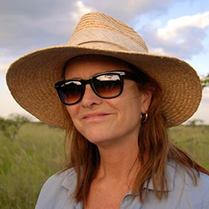|
We reached out to the winning filmmakers from our International Elephant Film Festival and asked them five questions about the experience of creating their films. Trailer for Explorer: Warlords of Ivory What inspired you to make this film? Katie Carpenter: "I have worked in wildlife filmmaking for almost 20 years (gulp). Our production team worked for the previous two years on another film about elephants and the threats to their survival — that film took us half-way around the world, to the ivory markets in Asia, and when we were done, it felt like we had left a big stone unturned. That was the rumor, until then unproven, that terrorist groups in Africa were getting into the poaching game, and using the now ultra-valuable tusks to buy weapons. We wanted to try to get to the bottom of that story." J.J. Kelley: "This was our second film on the illicit trafficking of elephant ivory, and after making the first we all felt we'd just scratched the surface. "Warlords of Ivory" has allowed me to push the scope of my approach to documentary film and the ability to capture complex environmental ideas within a character driven crime story." Were there any particularly meaningful moments or experiences in the process? Katie Carpenter: "The whole production timeline was utterly unforgettable. The most memorable moments for me were the times when it was proven to us that the fake tusks we had created to house the transmitters that might expose the smugglers routes, and the smugglers themselves, were actually authentic enough to fool the authorities in the countries where we were working. I was stopped the first time in Dubai, detained at the airport while they reviewed my credentials and checked out my story." J.J. Kelley: "A moment I will always remember was being arrested with Bryan Christy in Tanzania as a suspected ivory trafficker. We were traveling with fake tusks that contained tracking technology; we wanted to find out who the bad guys were doing business with. We were also wondering if our fake tusks would look convincing to someone who handles ivory. Well the fake tusks were pretty good because we were pulled off our flight and spent a night in police custody. The next day the whole mess was sorted out, but calling home with news that I'm in jail abroad is never a call that anyone likes to make." Describe some of the challenges? Katie Carpenter: "Our biggest challenges were technical — how to make the batteries small enough to fit inside a tusk yet large enough to last for the 6-12 months of the investigation? How to make the antenna inside the tusk as flexible and strong as possible so that it could always see the sky, no matter where it was, upside down or right side up, in the bottom of a crate or under the contents of a container — we needed to test it in every circumstance to make sure it could communicate with the satellite all along its journey." J.J. Kelley: "For the film we embedded with soldiers on the frontline of the ivory war. These are men and women charged with protecting wildlife, but who's actual challenges involved saving people. Their fight is a bloody one where dwindling wildlife products fetch a huge price, and as an illicit commodity it's traded in conjunction with guns and people. Four of the men we met have since been killed protecting wildlife. It's really heartbreaking to hear that as a people we are still willing to kill animals and people for elephant ivory." What are you working on now? Katie Carpenter: "I am a producer on a 6-part documentary series about crimes against the oceans and ocean wildlife, called “Ocean Ops”. Illegal fishing, slavery at sea, shark finning, “fish laundering”, it seems there is no end to the greed of poachers and illegal wildlife smugglers, whether on land or at sea." J.J. Kelley: "I've been in Antartica three times in the past 6 months for a new National Geographic series looking at those carrying out cutting edge science at the bottom of the world. For the show I've spent a month in a Scott Tent camping at -40F on an ice shelf, lived on the most powerful non-nuclear ship in the world for 53 days and spend a month at sea following arguably some of the most influential whale researches in the world." Anything else you would like people to know? Katie Carpenter: "I recommend that everyone find out something they can do to advocate for the survival of wildlife — write about it, talk about it, contact your Congressman or get online and make some noise. This planet would be a very lonely place if we were here all alone, without those species that are now threatened or endangered. Elephants and other mammals — dolphins, whales, apes — who talk, and mourn, and raise their kids with love and discipline, and express compassion — these are so important to us, we do not want their blood on our hands, we don’t want to live here without them in the future." J.J. Kelley: "The world is changing and our actions often drive that change. We've damaged some of our natural systems to a breaking point. We really need to ask ourselves if we want the next generation to go without ever seeing a tiger, a polar bear or an elephant. If you need any info about me, my bio is at www.jjkelley.com"  Katie Carpenter is an award-winning filmmaker specializing in wildlife, science and conservation subjects for public and cable television. Most recently, she produced two National Geographic specials for PBS, Bones of Turkana and Battle for the Elephants, filmed on location in Kenya, Tanzania and China. Her current production is The Secret Lives of Elephants (working title) on the illegal ivory trade for the National Geographic Channel. Her films have aired on PBS, Discovery Channel, MSNBC, Fox, Animal Planet, ABC and the Disney Channel, and have been shot across East Africa, Southern Asia, Latin America and the U.S.  J.J. Kelley is an Emmy-nominated filmmaker and explorer focusing on wildlife conservation, exploration, and wildlife crime. He’s the 2014 recipient of the Blue Ocean Film Festival’s Best Short Film for GYRE, a National Geographic documentary he directed on the mounting tragedy of ocean trash killing wildlife. He’s also the winner of the Jackson Hole Wildlife Film Festival’s Best Conservation Film for Battle for the Elephants, a 1-hour NGTV-PBS special on brutal slaughter of African elephants for their tusks, fueled largely by China’s demand for ivory.
0 Comments
Leave a Reply. |
Archives
March 2024
Categories
All
|
Contact UsJackson Wild
240 S. Glenwood, Suite 102 PO Box 3940 Jackson, WY 83001 307-200-3286 info@jacksonwild.org |

 RSS Feed
RSS Feed